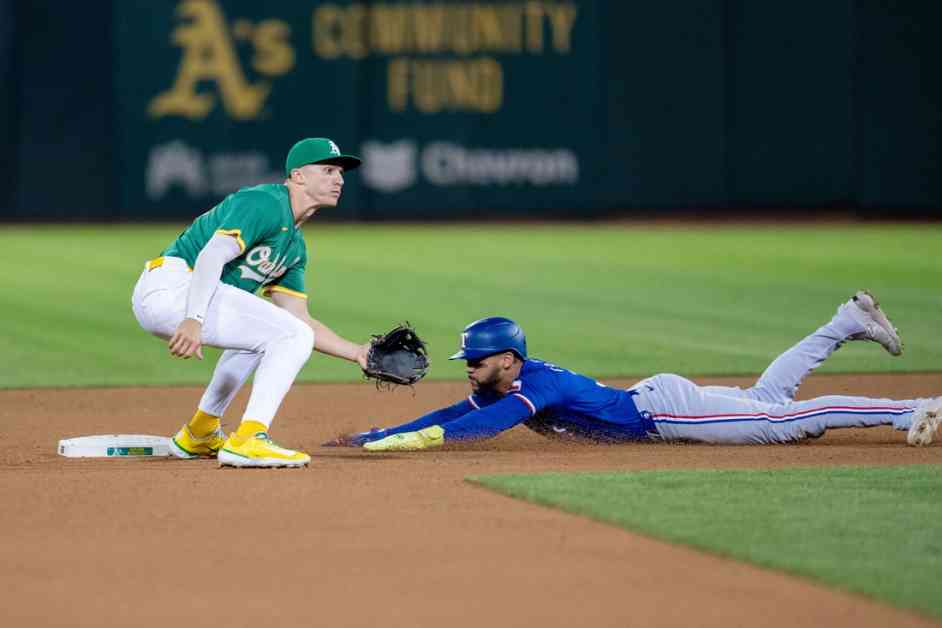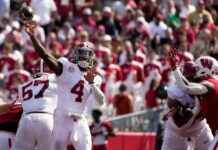The Oakland Athletics stage a thrilling comeback against the Texas Rangers
In a dramatic showdown at the Oakland-Alameda County Coliseum, the Oakland Athletics pulled off a stunning ninth-inning comeback against the defending champion Texas Rangers. The game was a rollercoaster of emotions, with both teams fighting tooth and nail for the win. Jacob Wilson emerged as the hero of the night, singling home Zack Gelof from second base with one out in the bottom of the ninth inning to secure a 5-4 victory for the Athletics.
The game was marked by tense moments and clutch plays from both sides. After closer Mason Miller navigated a tricky first-and-third, one-out jam to keep the game tied at 4-4 in the top of the ninth, Gelof kickstarted the Athletics’ rally with a leadoff single off Josh Sborz. Gelof’s steal of second base set the stage for Wilson’s game-winning hit, as he drove a pitch into center field to bring Gelof home in a nail-biting finish.
Miller, who pitched a crucial inning to secure the win, was credited with the victory. The Athletics had held a narrow lead throughout the game, only for the Rangers to claw their way back into contention. Jonah Heim’s solo home run in the eighth inning leveled the score, setting the stage for the dramatic finish in the ninth.
Dramatic performances on the mound and at the plate
The game featured standout performances from both teams, with key players stepping up in crucial moments. Rangers starter Nathan Eovaldi delivered a solid performance, going seven innings and allowing four runs on four hits. Despite Eovaldi’s efforts, the Athletics managed to build an early lead with timely hits from Shea Langeliers and Tyler Soderstrom in the first inning.
The Rangers fought back with Adolis Garcia’s RBI double in the first inning and Nathaniel Lowe’s solo home run in the fourth. Marcus Semien, a former Athletic, contributed two hits for the Rangers, while Garcia and Josh Smith also made their presence felt at the plate. The Rangers out-hit the Athletics 10-6, showcasing their offensive prowess throughout the game.
On the mound, Mitch Spence started for the Athletics, pitching 4 2/3 innings and allowing three runs on seven hits. Despite a solid outing, Spence was pulled from the game after Heim was hit by a pitch with the bases loaded in the fifth inning. The game remained tightly contested, with both teams trading blows until the dramatic finish in the ninth inning.
A memorable night for the Oakland Athletics and their fans
The victory over the Texas Rangers was a fitting start to the Athletics’ three-day going-away party, as they prepare to close out their 57 years in Oakland. The win was a testament to the team’s resilience and fighting spirit, as they overcame a tough opponent in the defending champions. The game was filled with memorable moments and standout performances, leaving fans on the edge of their seats until the final out.
As the Athletics bid farewell to Oakland-Alameda County Coliseum, they will look back on this game as a fitting tribute to their time in the city. The thrilling comeback against the Rangers showcased the team’s ability to rise to the occasion and deliver when it mattered most. With the playoffs on the horizon, the Athletics will look to build on this momentum and carry it forward into the postseason.
Overall, the game was a thrilling showcase of baseball at its best, with both teams leaving everything on the field in pursuit of victory. The dramatic ninth-inning comeback by the Athletics will be remembered as a defining moment in their season, setting the stage for more exciting games to come. As the team prepares to embark on a new chapter in a new city, they can take pride in their performance against the Rangers and the memories they created for their fans in Oakland.












